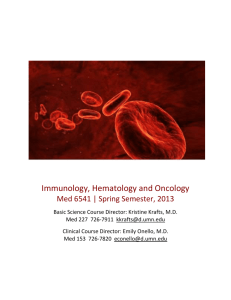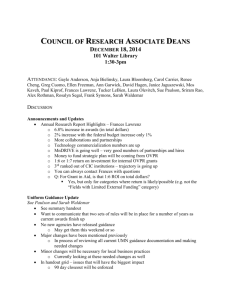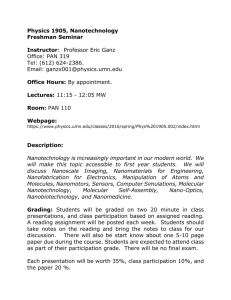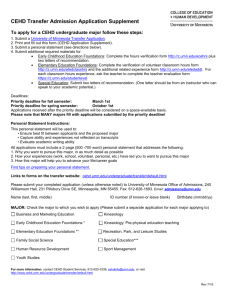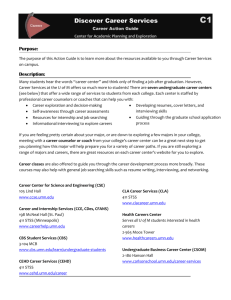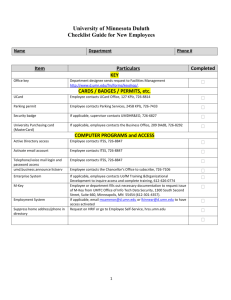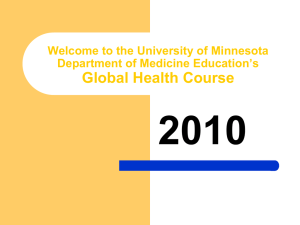HEMATOPOIESIS AND HOST DEFENSES
advertisement
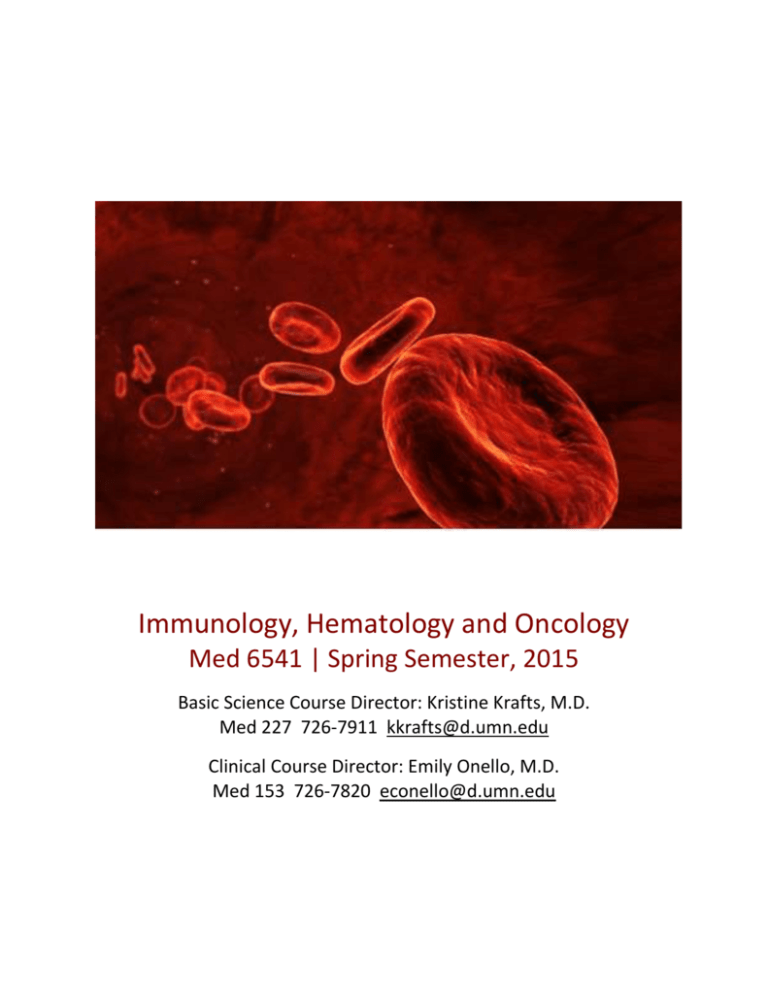
Immunology, Hematology and Oncology Med 6541 | Spring Semester, 2015 Basic Science Course Director: Kristine Krafts, M.D. Med 227 726-7911 kkrafts@d.umn.edu Clinical Course Director: Emily Onello, M.D. Med 153 726-7820 econello@d.umn.edu Course Description Immunology, Hematology and Oncology is a three-part interdisciplinary course. The immunology portion of the course covers the elements of immunology, including the structure and function of immune system components, and the principles of innate and acquired immunity. Diseases resulting from abnormalities of the immune system are also covered. The hematology part of the course covers the basic principles of hematology, including the structure and function of the cells and organs of the hematologic system, and the features of hematologic diseases. The oncology portion of the course covers general principles of oncology including the origin, development, and treatment of tumors. Content from many different disciplines, including biochemistry, nutrition, pathology, pharmacology, and clinical science, is used to construct a complete framework for understanding these separate but closely related systems. Course Textbooks The following textbooks are optional and may be useful to you as references: 1. Geha, Case Studies in Immunology, a Clinical Companion, 6th ed. Garland Science, 2012. ($47.20, Kindle edition) 2. Katzung, Basic & Clinical Pharmacology, 13th ed., Appleton & Lange, 2015. (available online for free on Access Medicine) 3. Kuby Immunology, 7th edition. Owen, Punt, Stranford. W. H. Freeman, 2013. 4. Kumar, et al., Robbins & Cotran Pathologic Basis of Disease, 9th ed., Saunders: Philadelphia, 2015. 5. Marks, Basic Medical Biochemistry, 4th ed. Williams & Wilkins: Baltimore, 2012. 6. Review of Medical Microbiology and Immunology, 12th edition. Levinson. Lange, 2012 (available online for free on Access Medicine). Part VII (Chapters 57-68) focuses on immunology. IHO – page 2 of 5 Course Wiki Our course wiki is the repository for all the information about our course. The address is: https://wiki.umn.edu/MedDuluth/ImmunologyHematologyOncology We hope that you will use this wiki as your portal for information about the course, and that you will feel at home contributing your thoughts and knowledge. Please check back frequently; new information (course changes, answers to student questions) will be posted under the Directors Corner section. Exams The course has 6 exams. Broadly speaking, the exams will cover the prior week’s material. If there is any deviation to this schedule (for example, if a particular lecture will not be on the following Monday’s exam), I’ll post that information on the wiki in the Director’s Corner. In addition to the exams, there will be a 10 point assignment in conjunction with Dr. Fitzakerley’s Simulation Case. Exam 1: All lectures from Monday, April 20 through Friday, April 24 Exam 2: All lectures from Monday, April 27 through Friday, May 1 Exam 3: All lectures from Monday, May 4 through Friday, May 8 Exam 4: All lectures from Monday, May 11 through Friday, May 15 Exam 5: All lectures from Tuesday, May 19 through Friday, May 22 Final Exam: All lectures from Tuesday, May 26 through Monday, June 1, plus a comprehensive component covering the entire course (see below). The Sim lab scheduled for June 2 will have a written assignment rather than having explicit test questions asked on the final exam. Exam dates, times, and approximate points are as follows: Exam 1 (40 points): Monday 4/27/15, 9:00 – 10:00 Exam 2 (44 points): Monday 5/4/15, 8:00 – 9:00 Exam 3 (38 points): Monday 5/11/15, 9:00 – 10:00 Exam 4 (40 points): Monday 5/18/15, 11:00 – 12:00 Exam 5 (28 points): Tuesday 5/26/15, 9:00 – 10::00 Final Exam (30 points + 65 cumulative points): Friday 6/5/14, 9:00 – 12:00 Exams will be computer scored and an item-analysis performed on all exam questions. Question appropriateness will be at the discretion of the Course Faculty. Tests and exams will be administered in accordance with the Duluth Campus Examination Policy and Honor Code, which outlines legitimate reasons for absences. IHO – page 3 of 5 Course Grading Policy In accordance with the U of M Medical School Grading Policy, all final course grades will be either Pass (P), Not Pass (N) or Honors (H). An incomplete grade (I) will be assigned whenever coursework has not been completed due to legitimately excused absences, such as an extended illness. In order to receive a grade of pass (P), a student must obtain 70% or more of the points available for the entire course (including the final exam) AND 70% or more of the cumulative points available on the final exam, in accordance with Medical School Policy. A grade of 90% or higher for the entire course – or for the final exam – will be required for honors (H). If no students achieve this level of performance, the faculty will consider setting a lower criterion. Remediation The Immunology, Hematology and Oncology faculty reserves the right to develop a remediation program that is unique to each student, which may include exam formats other than multiple choice questions. If a student receives a grade between 60% and 70% in the course or on the final exam, a remedial exam may be offered as part of the remediation program. In accordance with the Duluth Campus remediation procedure, a student must achieve a grade of 70% on the remedial exam in order to remediate the N grade. If the student fails to pass the remedial exam, he or she will be required to repeat the course. If a student’s score in the course is substantially below 70% (i.e., <60% of total course points), the faculty will meet to determine if remediation will be offered to that student. If a remedial exam is recommended, it will be scheduled as soon as feasible. Most often this is scheduled during the summer, when Year 1 classes have been completed. It is the students' responsibility to check their final grades and to make arrangements with the Course Director to remediate a grade of "N" or remove a grade of "I". Student Evaluation of the Course Evaluations are very important to us as we plan for the following year’s course. All courses use CoursEval for student evaluations. We will have a special reward for the class if ≥90% of the class fills out the evaluation form – more details on that as we near that point in the course. In addition, please email either course director (kkrafts@d.umn.edu or econello@d.umn.edu) as issues arise throughout the course so we can deal with them as they occur. IHO – page 4 of 5 Special Student Needs Accommodations can be made for students with special needs. Students must contact the Student Affairs Office to make arrangements for such accommodations. Course Faculty Dr. Ben Clarke Dr. Kevin Diebel Dr. Steve Downing Dr. Janet Fitzakerley Dr. Basem Goueli Dr. Alan Johns Dr. Peter Kebbekus Dr. Kristine Krafts Dr. Thomas Nelson Dr. Daniel Nikcevich Dr. Emily Onello Dr. Amy Prunuske Dr. Jean Regal Dr. Pat Scott Dr. Andy Skildum Dr. Ruth Westra Dept. of Biomedical Sciences bclarke@d.umn.edu Dept. of Biomedical Sciences kwdiebel@d.umn.edu Dept. of Biomedical Sciences sdowning@d.umn.edu Dept. of Biomedical Sciences jfitzake@d.umn.edu St. Luke’s Hospital bgoueli@slhduluth.com Dept. of Family Medicine ajohns1@d.umn.edu Essentia Health peter.kebbekus@essentiahealth.org Dept. of Biomedical Sciences kkrafts@umn.edu Essentia Health Thomas.Nelson@essentiahealth.org Essentia Health Daniel.nikcevich@essentiahealth.org Dept. of Family Medicine econello@d.umn.edu Dept. of Biomedical Sciences aprunusk@d.umn.edu Dept. of Biomedical Sciences jregal@d.umn.edu Dept. of Biomedical Sciences pscott@d.umn.edu Dept. of Biomedical Sciences askildum@d.umn.edu Dept. of Family Medicine rwestra@d.umn.edu IHO – page 5 of 5
